The heater in Ford F-350 Super Duty ensures comfortable temperature in the passenger compartment when the weather is chilly. There are many reasons for poor heating performance in F-350, which are explained in this article.

The heater may stop working in Ford F-350 Super Duty due to low coolant level or air in the cooling system, clogged heater core, bad thermostat, faulty blend door actuator, bad water pump, dirty cabin air filter, bad blower motor, or HVAC control unit malfunction.
1. Low coolant or air in the cooling system
Low coolant level or air in the cooling system can cause the heater to stop working properly in F-350. If the cooling system is not full and bled properly, the water pump will not be able to push the coolant around the system efficiently.
The heating system in F-350 uses hot coolant or antifreeze from the engine block to heat the interior of the vehicle. The hot coolant is pumped through the heater core located behind the dashboard. When you turn on the heating, air gets blown through the heater core, warming the air in the cabin.
If there is air trapped inside the heater core, the coolant will not be able to flow through it properly. Since the heater core is usually slightly higher, the air will accumulate in there first. By filling and properly bleeding the system the heat should come back.
Sloshing water sound
Low coolant level or air in the heater core can sometimes cause sloshing sound from behind the dashboard when the engine is running. The sound is most prominent right after you start the vehicle.
Check coolant level
Checking coolant level in F-350 is a fairly some job. You just have to locate the coolant overflow reservoir and inspect the level of coolant in it. If the coolant level is low, open the cap and pour some coolant into the tank until it is between minimum and maximum mark.
Recommended video
2. Clogged heater core
Clogged heater core is one of the leading causes of heating not working in Ford F-350 Super Duty. The design of the heater core is similar to the radiator, it has narrow internal channels through which hot coolant flows. Over time, the heater core can begin to rust or mineral deposits can form in these channels, blocking the flow of the coolant.
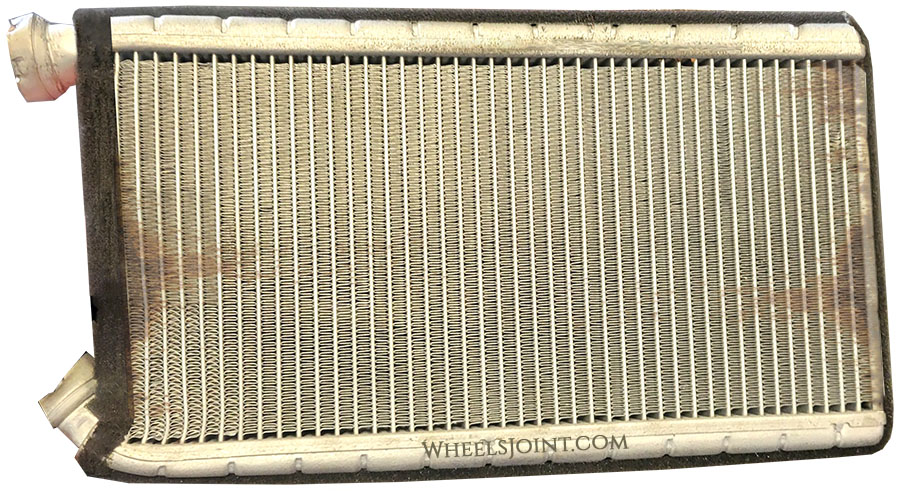
How to check if the heater core is clogged
You don’t have to remove the heater core in your F-350 to check if it is clogged. Locate two rubber hoses that connect to the heater core through the firewall area. Feel both the rubber lines going in and out of the heater core after the engine has warmed up. Both should be hot. If one is hot and the other is cold, you have a plugged heater core.
Flush the heater core
Before you consider replacing the heater core in your F-350, it is recommended to flush the existing heater core. Flushing is done by pushing water through the outlet hose of the heater core and draining the gunk from the inlet hose. There are flush kits available in the market that can help you do the job yourself.
3. Bad thermostat
Thermostat is a part of the cooling system in Ford F-350 Super Duty which ensures that the engine reaches its optimal operating temperature as quickly as possible and maintain it under all operating conditions.
Thermostat is stuck open
When you start your F-350 when the engine is cold, the thermostat cuts off flow of coolant through the radiator in order to quickly reach the optimal engine operating temperature. But if the thermostat has developed a defect and is stuck to open position, the coolant will continuously flow through the radiator and the engine may take a long time to reach its optimal operating temperature.

Heater takes a long time to blow hot air
Since the heating system in F-350 relies on the hot coolant from the engine to heat the interior, the heater will blow cold air until the engine reaches its normal operating temperature. But if the weather is too cold, the engine may never reach its optimal operating temperature with a stuck open thermostat. Your vehicle may also consume more fuel than normal.
5. Bad water pump
The water pump is the heart of the cooling system in F-350 responsible for pumping coolant throughout the system and cooling the engine. If the water pump has worn out and the coolant is not being circulated as effectively as it used to, it can cause the heater to stop working properly because there’s less coolant available to transfer heat between the engine and the heater core.
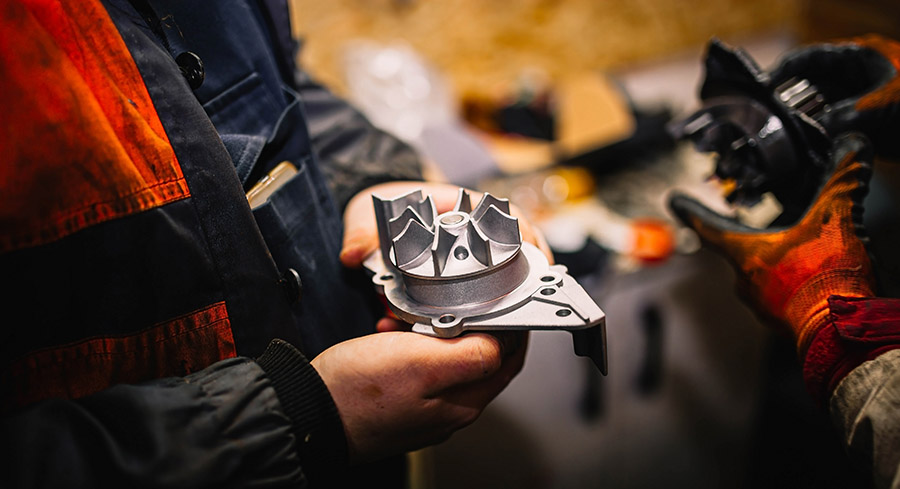
Water pumps usually last for more than 100,000 miles, but they can fail at any time. A bad water pump will not only cause poor heating, but can also result in engine damage due to overheating. Therefore it is important to diagnose a failing water pump at early stages to avoid expensive repairs later on.
6. Faulty blend door actuator
Blend door actuator plays a role in controlling the temperature inside your F-350. If the blend door actuator fails to fully open the blend door towards the heater core, it will result in poor heating performance.
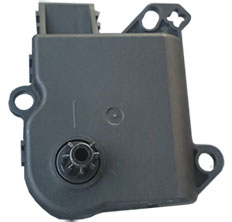
The most common symptom of a faulty blend door actuator in Ford F-350 Super Duty is a slight clicking sound (or other unusual noise) repeatedly coming from under the dashboard. The sound will be most prominent for a few seconds when you turn on the air conditioning or adjust the temperature.
Symptom: knocking sound
A knocking noise from behind the dashboard could be an indicator of a bad blend door actuator in your F-350. The sound is something like a light tapping on the door and it typically happens when you turn on/off the air conditioning system or start the engine.
Symptom: creaking sound
One side hot, other side cold
A common symptom of a faulty blend door actuator in vehicles with dual zone climate control system is one side blowing hot air while the other side is blowing cold air.
Replace the faulty part
A bad blend door actuator usually cannot be repaired and must be replaced with a new one. Due to the complexity of the replacement job, it is not recommended as a DIY project. The blend door actuator may require recalibration after replacement.
7. Dirty cabin air filter
Dirty cabin air filter is the leading cause of weak heater airflow in Ford F-350 Super Duty. The pollen filter, also known as the cabin air filter or microfilter, is responsible for filtering the air that the passengers breathe in the cabin. A dirty filter causes the overall ventilation of the interior to deteriorate resulting in reduced heating and airflow.
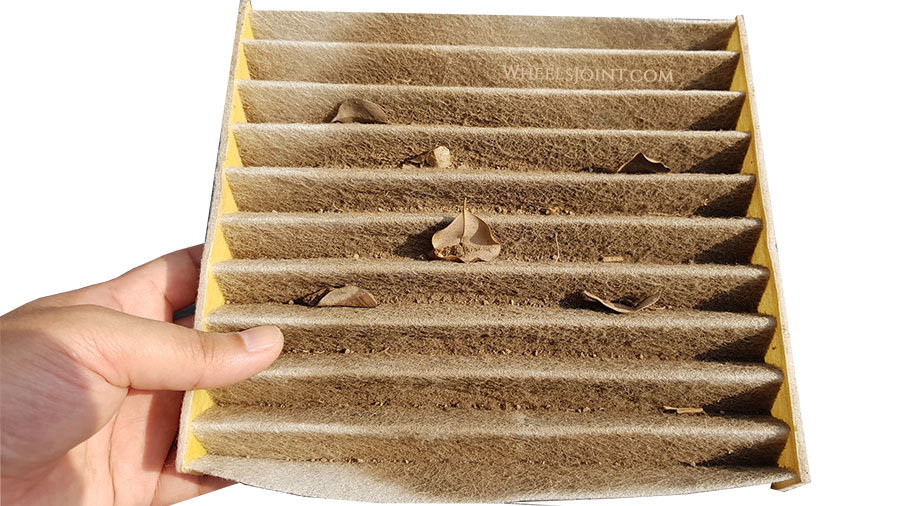
There is no fixed time for replacing the cabin air filter, but most manufacturers recommend a change after 10,000-20,000 miles. If you drive your vehicle in dusty or polluted environment, the filter can get dirty much sooner than manufacturer’s recommendation. Additionally, if you drive your F-350 with AC system set to fresh outside air most of the time, your cabin air filter will get dirty much sooner as compared to air recirculation mode.
Replace the filter at the start of every winter for optimal performance
It is generally recommended to replace the cabin air filter every year at the start of the winter season. Spring and summer seasons are hard on the cabin air filter because of pollen and bugs, and in the fall they can get clogged with leaf debris. This gives you a fresh start for the winter, improves defroster performance, and reduces chances of mold or mildew growth.
Recommended video
Can you clean a dirty cabin air filter?
Instead of changing the cabin air filter in F-350, it is often recommended to first clean the filter. This can be done, for example, with a vacuum cleaner or a compressed air system, removing at least a large part of the visible dirt particles. Unfortunately, this procedure does not allow you to get into the deeper layers of the filter. Therefore, the filter performance will not increase significantly even after cleaning. As a rule, there is no avoiding a change if the filter is dirty.
8. Sluggish blower motor
If the blower motor in your F-350 is not spinning fast enough either due to an internal defect or due to a fault in the resistor/control module, the airflow from the AC vents will be weaker and the heating performance will be degraded.
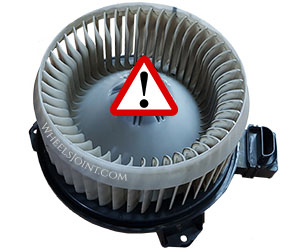
When a blower motor goes bad, it usually makes unusual noises when in operation, and the passengers may feel reduced airflow from the air vents. Keep in mind that reduced airflow doesn’t always indicate a problem with the blower motor, as it can also happen due to a clogged cabin air filter, dirty evaporator, or a bad mode door actuator. So, all of them must be inspected when diagnosing poor airflow.
9. Dead blower motor (no airflow)
If there is no air flow from the air vents in the dashboard when you turn on the heater in your Ford F-350 Super Duty, it means the problem is related to the fan or blower motor function.
The most common causes for blower motor not working in Ford F-350 Super Duty are blown fuse, bad relay, resistor or control module malfunction, and faulty blower motor. However, a bad electrical connector or broken wire, or a defect in the climate control unit can also cause the blower motor to stop working.
10. Dirty evaporator
Dirty evaporator can cause weak airflow and reduce the heating performance in F-350. Although, the evaporator coil is a component of the cooling function of the air-conditioning system, but the air always first passes through the evaporator and then flows over the heater core.
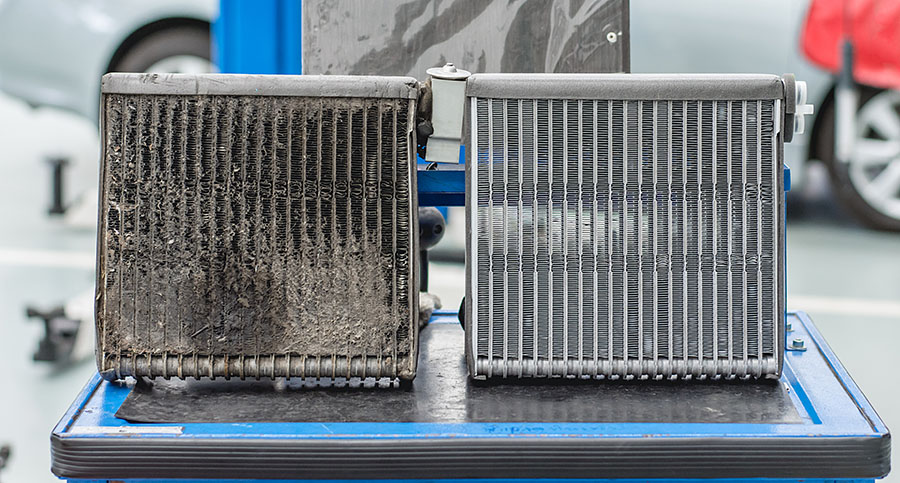
The cabin air filter captures most of the dirt or other airborne particles, but some particles escape and can get lodged on to the evaporator. Over time, these particles build up on the fins and block the air flow through the evaporator, causing reduced air flow in the cabin and poor heating or cooling.
Function of the evaporator in heating mode
When the heater is turned on and the AC turned off, the compressor does not turn on and the evaporator is not cooled. When you press the AC button in heating mode, the compressor turns on and the evaporator cools and dries the air before it enters the heater core. This mode is useful for clearing fog from the windows.
11. Faulty HVAC module
Climate control module is the brain of the air-conditioning system in your Ford F-350 Super Duty, responsible for controlling all the components in the system. In rare cases, a fault in the climate control unit can cause the heater to stop functioning. This would require a scan tool to confirm correct operation.
12. Blown head gasket
The head gasket is responsible for providing the seal between the engine block and cylinder heads. Its purpose is to seal the combustion gases within the cylinders and to avoid coolant or engine oil leaking into the cylinders. Leaks in the head gasket can cause all sorts of problems in your F-350 including poor heater performance. This is mostly common in older vehicles.
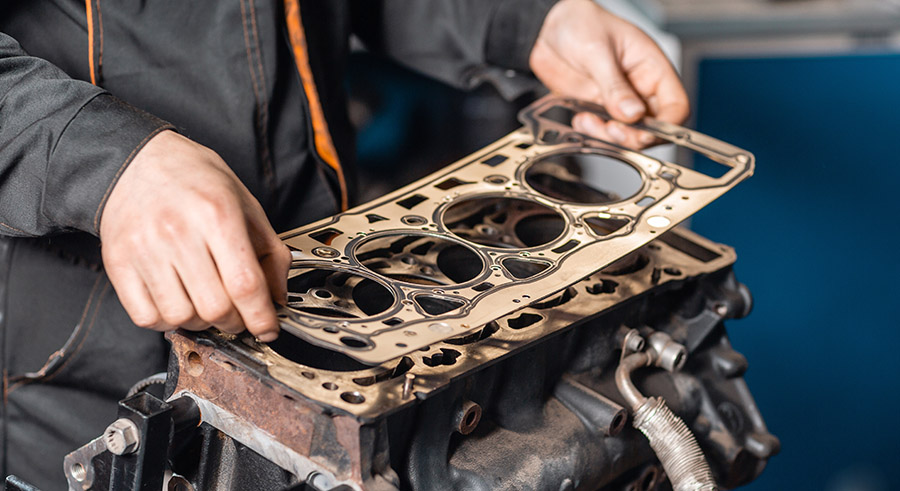
Leaking exhaust gases
A blown head gasket can cause the exhaust gases from the engine to enter the cooling system and plug the heater core. Clearing the air from the heater core will not help until the head gasket has been replaced.
Leaking coolant
A blown head gasket can cause coolant to leak into the combustion chambers and burn off. If your F-350 is losing coolant, that means there is a leak somewhere or it is getting burned up inside the engine.
How to check if head gasket is leaking in F-350?
You don’t have to go to a workshop to check for a leaking head gasket in your F-350. There are test kits available in the market in which you just have to insert a tube filled with colored liquid in the radiator (in place of the radiator cap), and then start the engine. If the liquid changes color, then there is a leak in head gasket.
Switch on air recirculation mode
When the outside temperature drops too low, the heating performance may be reduced in F-350 if the air conditioning system is set to outside air. To improve heating efficiency, it is recommended to switch on air recirculation mode. Don’t worry, there is no risk of suffocation, as the air recirculation mode still allows up to approximately 10 percent of the air coming from the air vents to be fresh air from the outside.

Conclusion
There are many reasons why the heater in your Ford F-350 Super Duty is not working properly. When looking for the reason, you should start with the most obvious causes: low coolant level or air in the cooling system, and clogged heater core.
In any case, it is advisable for laypersons to visit a workshop. A professional mechanic can swiftly diagnose the heating issue for you.




I had no heat in cabin. Fans worked. I topped off the radiator fluid – nothing. So, I took the inlet/outlet hoses off of the firewall and cranked the engine – there was no coolant flow. I changed both thermostats (yes it has 2) and I got lots of heat now (and coolant flow through heater core).